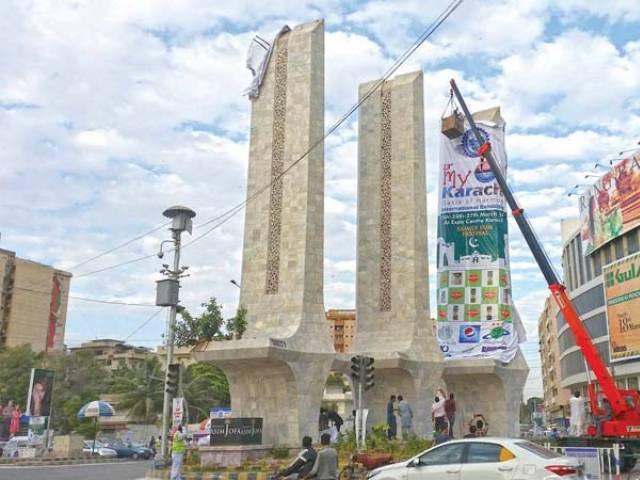Inspection of 'controversial construction' of pedestrian bridge at Teen Talwar ordered
Contract for building awarded to private advertising company by KMC.

PHOTO: EXPRESS
Headed by Justice Nadeem Akhtar, the division bench also tagged together two petitions challenging KMC’s contract that allows private outdoor advertising companies to build pedestrian bridges and then use them for advertising purposes with certain relaxations in advertisement taxes.
PTI lawmaker rips away veils shrouding Teen Talwar
The order for inspection came on a petition filed by a resident of Clifton, Sheikh Muhammad Rizwan Akram, who moved the court against the local government secretary, Karachi administrator, District Municipal Corporation (DMC) South administrator and private advertising company Bench Mark.
The petitioner said DMC South had awarded a contract for constructing a pedestrian bridge to Bench Mark advertising company, which is raising structural constructions. The bridge is being built in front of Hamilton Court Apartments at Teen Talwar. The bridge was being built on the green belt, the petitioner added.
Akram pointed out he had come to know that DMC South had unlawfully awarded several contracts to individuals or companies engaged in the outdoor advertising business to build pedestrian bridges with exclusive rights to display their advertisement signboards or billboards there.
The petitioner said he approached DMC South office with a request to get a copy of the contract but was denied. He said the pedestrian bridge was being built 25 yards away from the zebra crossing at the signal with malafide intentions to favour the advertising company.
The petitioner’s lawyer, Hassan Sabir, argued that the law does not permit installing billboards or signboards on public property, adding that the Supreme Court had recently directed KMC to remove all outdoor advertising billboards and signboards from ‘public property’.
“Awarding contracts to install/occupy public property for constructing pedestrian bridges and giving rights to display the advertisement material [on them] is unlawful and against the interest of the common citizens,” the lawyer argued.
Referring to the criteria laid down by the Supreme Court in the outdoor advertisements display case, he argued that where there was a zebra-crossing available to the public, there was no need to build a bridge.
During Monday’s proceedings, the judges were informed that the private advertising company was still continuing construction on the site despite the court’s stay order, which is tantamount to committing contempt of the court order.
Therefore, the court was pleaded to initiate contempt proceedings against the respondent, Zeeshan of Bench Mark advertising company and others.
The bench issued notices to the alleged contemnors for June 29. Meanwhile, it appointed its official to submit a report as to whether or not construction of pedestrian bridge is still ongoing. The official will also report as to whether there are any signs of fresh construction. The judges also asked the official to take photographs, if necessary.
Tagged petitions
The same bench also tagged another petition filed by 14 residents of Hamilton Court Apartments, who had also challenged the awarding of contracts by the DMC South to private advertising companies for constructing two pedestrian bridges on Khayaban-e-Iqbal, near Gulf Shopping Centre in Clifton, and another on Sharae Faisal near Regent Plaza. In their plea, they had pleaded to the court to declare the contracts illegal and thus strike them down.
Published in The Express Tribune, June 21st, 2016.


















COMMENTS
Comments are moderated and generally will be posted if they are on-topic and not abusive.
For more information, please see our Comments FAQ